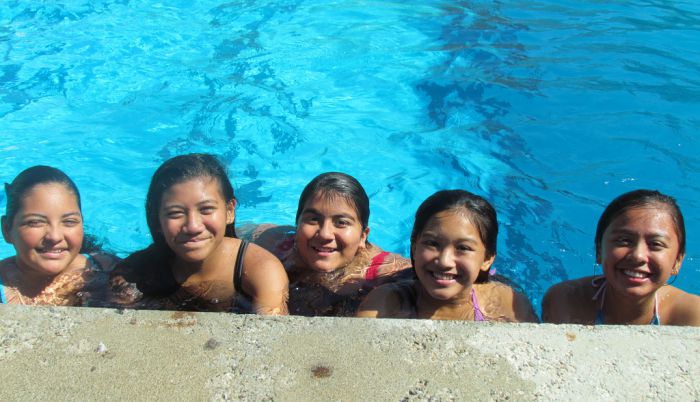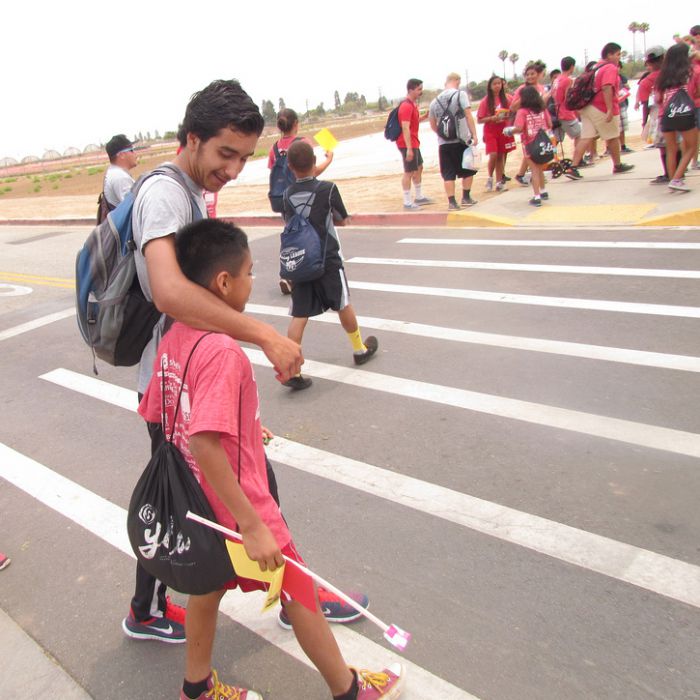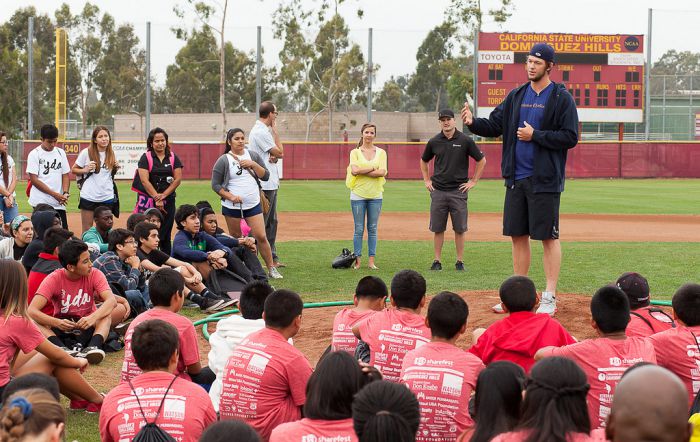Kicking, screaming, bobbing, and splashing…
 Nothing quite says summer camp like making new friends, having lots of fun in a sparkling swimming pool, and learning new skills. But for many children from underserved Los Angeles area communities, this experience is hard to come by.
Nothing quite says summer camp like making new friends, having lots of fun in a sparkling swimming pool, and learning new skills. But for many children from underserved Los Angeles area communities, this experience is hard to come by.
Working to offer kids more opportunities is Sharefest, a nonprofit organization dedicated to strengthening underrepresented communities by providing services for the children and families who live in those communities. For the past seven summers, they have partnered with California State University, Dominguez Hills to offer the Summer Youth Development Academy (YDA) on the university’s campus.
“We teach a lot of kids to swim… [I]n the communities they come from they don’t have access to pools,” Porsha Hayes said of the middle and high school students in the program.
Hayes is a senior sociology major at CSU Dominguez Hills. She and several other students, as well as alumni, from the university serve as YDA counselors, which makes Sharefest more than just an event held on campus by an outside organization. The four-week program provides valuable service-learning opportunities for university students.
In addition to swimming, playing field games, and crafts, more than 250 children from Carson, Harbor Gateway, Harbor City, San Pedro, Watts, and Wilmington communities participating in the camp throughout July receive academic instruction in creative writing, math, and science as well as health and wellness, team building, leadership development, and violence prevention. Experiences like these are what has kept YDA counselor and alumnus Sergio Centeno-de la Torre (Class of ’12, B.A., kinesiology) coming back each summer for the last three years.
“I get happy seeing kids having something to do in the summer. It’s great for the kids. It gives them something to do and stay out of trouble. It keeps them busy rather than just playing video games,” Centeno-de la Torre said. “I didn’t have any of that growing up. We could have used it in my neighborhood. A lot of my friends got steered in the wrong direction.”
To make sure at least some children have the opportunity to avoid summer brain drain–and trouble–a dozen volunteer counselors, many who are college students or graduates hailing from the same communities as the participants they mentor, not only guided students through activities led by experts each day, but also served as role models for attaining a college education.
“Here, everyone is so uplifting… that’s what we’re trying to do with the kids; uplift them and let them know that things are possible,” Hayes said of going to college.
Michael Ernst, chair and professor of kinesiology and recreation at CSU Dominguez Hills who facilitated the partnership that produced YDA, said that offering programs like YDA is particularly important during middle school years, because that’s when many students begin the process of becoming college-bound.

This was true for Gabriel Ramos, a senior Spanish major at CSU Dominguez Hills.
“I grew up in South Central L.A. … Not the [best] of communities, so camps like this during the summer; computer programs, karate camp, anything that would help keep me away from the streets, my parents ran to,” recalled Ramos, now a fourth year YDA counselor.
Beating the odds, he excelled in school and after he earns his undergraduate degree at the university, he plans to seek a teaching credential.
“When I heard about Sharefest and what they are trying to do; having the kids do something in the summer and not just be at home or be tempted to be into those [destructive] types of environments, I thought, what a great way to give back to something I once needed,” Ramos said.
Like his fellow Toro YDA counselors, Ramos has first-hand knowledge of the positive impact a university-based summer camp has on participants.
“Being on a college campus already creates that curiosity. … We get questions like, ‘Oh, you come to this school. How is it?’ The second we get those questions, we have the opportunity to not only share our own experiences, but to [discuss] how great a college experience they can have, wherever that may be,” Ramos commented.
Since YDA began in 2006, it has hosted nearly 1,100 middle school students at the campus. This year the program rolled out a high school component, with about 25 students participating–many who came out of the middle school program, as well as a parent orientation, which served more than 130 parents.
Sharefest and its corporate partners raised funds–about $500 per student–to provide programming, transportation, and lunch for the students for the duration of the program. And special guests offered additional enrichment opportunities for the students.
On a particular day, YDA high school students prepared questions and interviewed Los Angeles Councilman Joe Buscaino (District 15), and became part of a youth advisory council.
“The students are learning how to ask questions of an official. The public official will also ask [the students] for some data. So they are going to go out into their communities, report to their official in the fall on topics like immigration, and what’s going on in their schools,” said Sharefest executive director Chad Mayer who oversees the YDA program.

On another day, Los Angeles Dodgers pitcher Clayton Kershaw worked with students, not only to improve their aim over the plate but to inspire them to aim high in life.
“The program is a win-win for everybody. It’s a win for the university, it’s a win for the counselors–they get to use their talents, the kids benefit from it, the families benefit from it,” Mayer said. “Hopefully we instill those community values and hopefully the students come back and serve their communities.”
Ernst said the goal of the YDA program is also to plant the seed for the students to go to college–no matter which they choose.
For more information about YDA and Sharefest, visit sharefestinc.org or contact Michael Ernst at mernst@csudh.edu.
Photos courtesy of Sharefest.